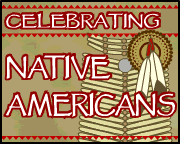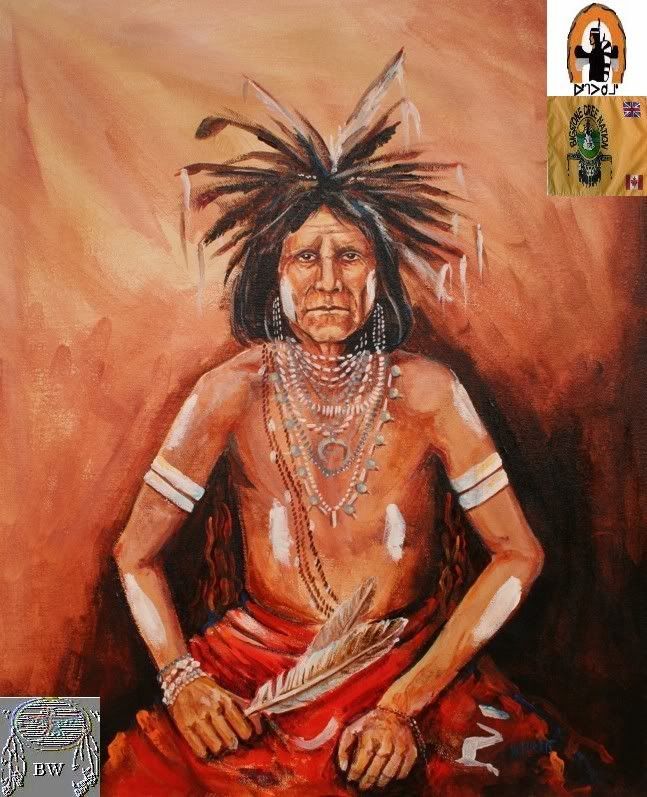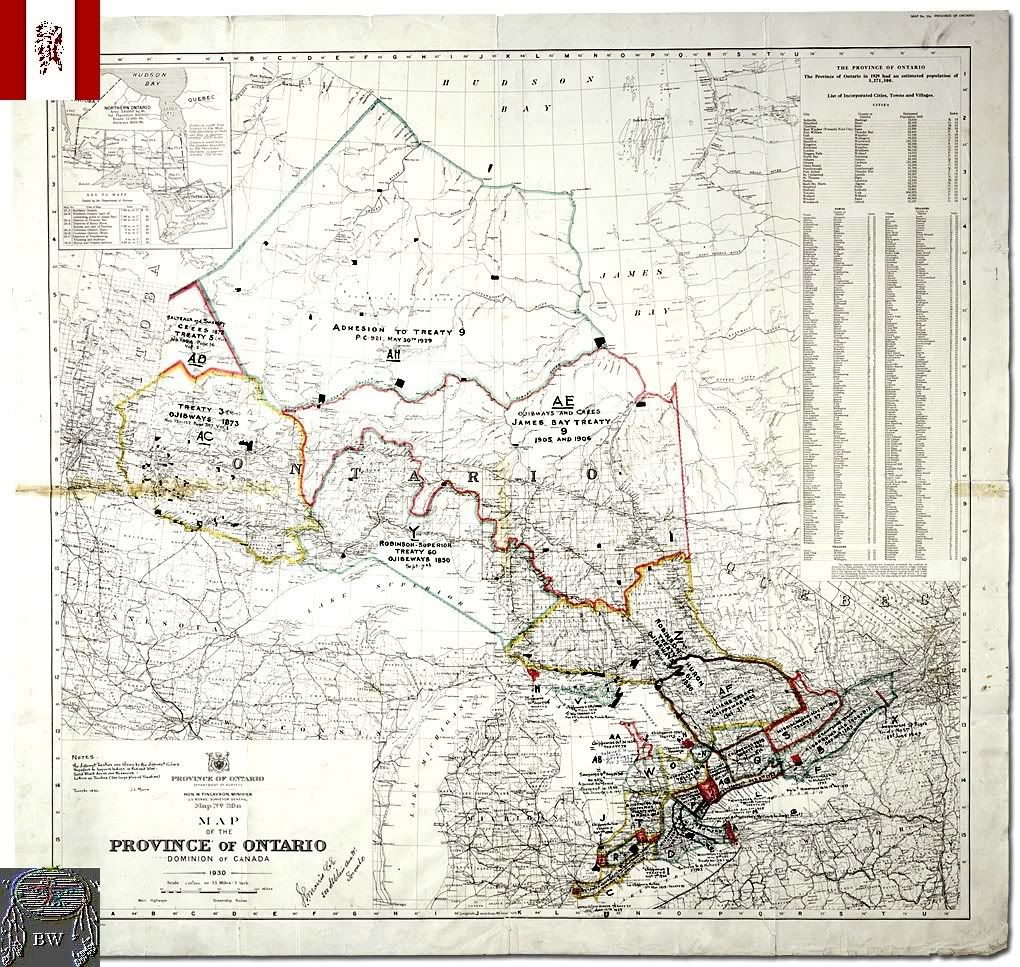|
BRAVEHORSE WARRIOR Kamdyistowesit
Cree Warrior

 Chief Kamdyistowesit
Warrior Citation
KAMđYISTOWESIT (Beardy, literally little moustache, known in French as Barbu), chief of the Willow band of the Plains Cree;
b. c. 1828 probably near Duck Lake (Sask.); d. 16 April 1889 at the Beardy Reserve (Sask.). The members of the Willow band
were related to, or allied with, the mixed-blood descendants of George Sutherland, who had been an employee of the Hudson’s
Bay Company at the end of the 18th century. Little is known of Beardy’s early life except that he was said to possess
spiritual powers or “medicine.” He became a chief about 1870 and a few years later was one of the Plains Cree
chiefs who welcomed the news that the government of Canada intended to make treaty with the Native Americans of the Saskatchewan
River district. However, he refused to attend the major council on 23 Aug. 1876 at which Treaty no.6 was negotiated by Alexander
Morris because the treaty commissioners would not respect a vision Beardy had had as to where this council should take place.
Finally, to obtain Beardy’s adhesion, a special meeting was held on 28 August with his people near Duck Lake [KŘpeyakwŘskonam].
On learning the terms of the treaty, Beardy expressed his dissatisfaction with what the government offered the Cree. He thought
the sections relating to assistance were inadequate in view of the crisis caused by the depletion of the buffalo herds. In
addition, he wanted a provision for the management of the remaining buffalo. Although his recommendations were not accepted,
Beardy saw no alternative for his people and signed. As stipulated in the terms of the treaty Beardy selected as his reserve
a site surrounding Duck Lake. When the agricultural equipment and animals promised in the treaty failed to arrive Beardy protested
to the lieutenant governor of the North-West Territories, David Laird, in September 1877. He also continued his efforts to
modify the treaty so that his band would receive sufficient assistance to survive the economic crisis Beardy foresaw. Receiving
no satisfaction from local officials, Beardy wrote to the governor general of Canada, Lord Dufferin [Blackwood], in January
1878. Beardy was a source of anxiety to government officials. In 1878 he argued that he was entitled to additional presents
and that his annuities and treaty goods should be brought to his reserve. When officials finally did go to see him and failed
to bring the presents and food he expected, he refused to accept the annuities and provisions they did bring. By December
Beardy’s people were destitute and he announced his intention of taking what his people needed from the local merchants.
A unit of the North-West Mounted Police was sent to Duck Lake and Beardy’s people were given their treaty money to purchase
the much needed goods. The crisis passed, but Beardy protested further when he did not receive all he had been promised by
the treaty commissioners.
Chief Kamdyistowesit
Warrior Citation
KAMđYISTOWESIT (Beardy, literally little moustache, known in French as Barbu), chief of the Willow band of the Plains Cree;
b. c. 1828 probably near Duck Lake (Sask.); d. 16 April 1889 at the Beardy Reserve (Sask.). The members of the Willow band
were related to, or allied with, the mixed-blood descendants of George Sutherland, who had been an employee of the Hudson’s
Bay Company at the end of the 18th century. Little is known of Beardy’s early life except that he was said to possess
spiritual powers or “medicine.” He became a chief about 1870 and a few years later was one of the Plains Cree
chiefs who welcomed the news that the government of Canada intended to make treaty with the Native Americans of the Saskatchewan
River district. However, he refused to attend the major council on 23 Aug. 1876 at which Treaty no.6 was negotiated by Alexander
Morris because the treaty commissioners would not respect a vision Beardy had had as to where this council should take place.
Finally, to obtain Beardy’s adhesion, a special meeting was held on 28 August with his people near Duck Lake [KŘpeyakwŘskonam].
On learning the terms of the treaty, Beardy expressed his dissatisfaction with what the government offered the Cree. He thought
the sections relating to assistance were inadequate in view of the crisis caused by the depletion of the buffalo herds. In
addition, he wanted a provision for the management of the remaining buffalo. Although his recommendations were not accepted,
Beardy saw no alternative for his people and signed. As stipulated in the terms of the treaty Beardy selected as his reserve
a site surrounding Duck Lake. When the agricultural equipment and animals promised in the treaty failed to arrive Beardy protested
to the lieutenant governor of the North-West Territories, David Laird, in September 1877. He also continued his efforts to
modify the treaty so that his band would receive sufficient assistance to survive the economic crisis Beardy foresaw. Receiving
no satisfaction from local officials, Beardy wrote to the governor general of Canada, Lord Dufferin [Blackwood], in January
1878. Beardy was a source of anxiety to government officials. In 1878 he argued that he was entitled to additional presents
and that his annuities and treaty goods should be brought to his reserve. When officials finally did go to see him and failed
to bring the presents and food he expected, he refused to accept the annuities and provisions they did bring. By December
Beardy’s people were destitute and he announced his intention of taking what his people needed from the local merchants.
A unit of the North-West Mounted Police was sent to Duck Lake and Beardy’s people were given their treaty money to purchase
the much needed goods. The crisis passed, but Beardy protested further when he did not receive all he had been promised by
the treaty commissioners.
 Beardy’s belief that the government was not honoring Treaty no.6 was further reinforced when the band’s
reserve was surveyed. Rather than allotting the band all the lands they wanted, the government excluded those parcels claimed
by the local MÚtis, and threatened Beardy with loss of treaty entitlement if he did not accept the exclusions. Land grievances
aside, hunger continued to be the band’s principal problem in the early 1880s, and Beardy is alleged to have killed
some treaty cattle to feed his people despite the fact they were intended for stock raising. When Governor General Lorne [Campbell]
visited the area in 1881 Beardy spoke to him about the need for more assistance and for the full and immediate implementation
of the treaty. This appeal had no effect; Beardy and other Cree chiefs including Poundmaker [Ptikwahanapiwyin], Big Bear
[Mistahimaskwa], K┘peyakw┘skonam (One Arrow), and Little Pine [Minahikosis] then came together at a meeting on his reserve
in August 1884. The treaty was discussed and plans were made for future action if demands for the redress of grievances continued
to be ignored. Beardy, Little Pine, and Big Bear began organizing a meeting of all Plains Cree chiefs which was to be held
in 1885. When rebellion broke out in the northwest in March 1885, however, Beardy remained neutral, though promises of food
and aid did attract a small number of his band to join Louis Riel. Beardy met Major-General Frederick Dobson Middleton at
Batoche (Sask.) and explained that he could not restrain his young men. After the rebellion, because Beardy and other members
of his band had left their reservation despite a proclamation forbidding such movements, the entire band was suspended from
treaty. Moreover, Beardy was no longer officially recognized by government officials as the spokesman for his people, although
his band continued to regard him as their leader until his death in April 1889. Beardy, at times dismissed as a gadfly and
nuisance, was a man of some foresight regarding the fate of his people and their culture. He recognized the inadequacy of
the treaty he signed, and from the beginning he sought to have it modified to provide the aid the Cree needed in a period
of crisis. Finding the government indifferent, he joined other Plains Cree leaders in a movement to pressure the government,
but before they could achieve their goal they were overtaken by the events precipitated by the MÚtis. From: historical accounts
& records
Beardy’s belief that the government was not honoring Treaty no.6 was further reinforced when the band’s
reserve was surveyed. Rather than allotting the band all the lands they wanted, the government excluded those parcels claimed
by the local MÚtis, and threatened Beardy with loss of treaty entitlement if he did not accept the exclusions. Land grievances
aside, hunger continued to be the band’s principal problem in the early 1880s, and Beardy is alleged to have killed
some treaty cattle to feed his people despite the fact they were intended for stock raising. When Governor General Lorne [Campbell]
visited the area in 1881 Beardy spoke to him about the need for more assistance and for the full and immediate implementation
of the treaty. This appeal had no effect; Beardy and other Cree chiefs including Poundmaker [Ptikwahanapiwyin], Big Bear
[Mistahimaskwa], K┘peyakw┘skonam (One Arrow), and Little Pine [Minahikosis] then came together at a meeting on his reserve
in August 1884. The treaty was discussed and plans were made for future action if demands for the redress of grievances continued
to be ignored. Beardy, Little Pine, and Big Bear began organizing a meeting of all Plains Cree chiefs which was to be held
in 1885. When rebellion broke out in the northwest in March 1885, however, Beardy remained neutral, though promises of food
and aid did attract a small number of his band to join Louis Riel. Beardy met Major-General Frederick Dobson Middleton at
Batoche (Sask.) and explained that he could not restrain his young men. After the rebellion, because Beardy and other members
of his band had left their reservation despite a proclamation forbidding such movements, the entire band was suspended from
treaty. Moreover, Beardy was no longer officially recognized by government officials as the spokesman for his people, although
his band continued to regard him as their leader until his death in April 1889. Beardy, at times dismissed as a gadfly and
nuisance, was a man of some foresight regarding the fate of his people and their culture. He recognized the inadequacy of
the treaty he signed, and from the beginning he sought to have it modified to provide the aid the Cree needed in a period
of crisis. Finding the government indifferent, he joined other Plains Cree leaders in a movement to pressure the government,
but before they could achieve their goal they were overtaken by the events precipitated by the MÚtis. From: historical accounts
& records
|

